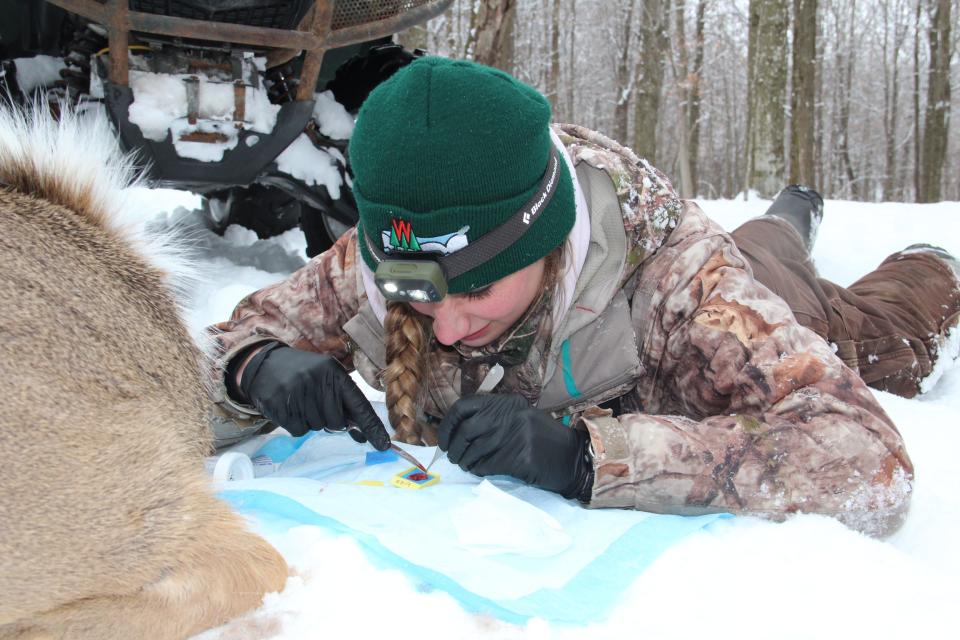Chronic wasting disease found in wild deer in Langlade County

The Department of Natural Resources last Wednesday announced the detection of chronic wasting disease in a wild deer in Langlade County.
The deer was a hunter-harvested 1-year-old buck taken in the Town of Wolf River.
It's the latest in a spate of initial CWD discoveries in recent months in wild deer in Wisconsin and follows similar announcements in Buffalo and Waupaca counties.
Chronic wasting disease is a fatal, infectious nervous system disease of deer, moose, elk and other cervids. It belongs to the family of diseases known as transmissible spongiform encephalopathies (TSEs) or prion diseases.
Although no human illness has been linked to the disease, the Centers for Disease Control and Wisconsin Department of Health Services recommend meat not be consumed from CWD-positive deer.
The DNR began monitoring the state's wild white-tailed deer population for CWD in 1999. The first positives were found in wild deer killed in late 2001 near Mount Horeb as well as in captive deer at a farm in Portage County.
Since then the disease has continued to spread to in the state's captive and wild herds.
As required by state law, the DNR enacts three-year baiting and feeding bans in counties where CWD has been detected and two-year bans in adjoining counties that lie within 10 miles of a CWD detection.
The recent detection of CWD in Langlade County will renew a 3-year baiting and feeding ban in the county, as well as a 2-year baiting and feeding ban in Menominee County.
Because the deer was harvested in close proximity to the Menominee Reservation, the Menominee Tribal Government has its own baiting ban within the exterior boundaries of the Reservation.
Baiting or feeding deer encourages them to congregate unnaturally around a shared food source where sick deer can spread CWD through direct contact with healthy deer or by leaving behind infectious prions in their saliva, blood, feces and urine, according to the DNR.
A meeting to discuss the Langlade County finding is scheduled for 6:30 p.m. Wednesday at White Lake High School in White Lake.
At the meeting DNR staff will provide information about CWD in Wisconsin, local CWD testing efforts and disease surveillance options being considered.
To learn more about CWD in Wisconsin, visit dnr.wi.gov.
Bird count: The 26th annual Great Backyard Bird Count will be held worldwide Feb. 17 to 20. The event is organized by the Cornell Lab of Ornithology and the National Audubon Society.
The organizations invite people to spend time in their favorite places watching and counting as many birds as they can find and reporting them. The observations help scientists better understand global bird populations before one of their annual migrations and help to paint a picture of how birds are faring in the face of habitat loss, climate change and other threats, according to the groups.
Each participant or group counts birds for at least 15 minutes and records the birds they identify. This can be done at home, in a park or during a drive or commute. An estimated 385,000 people participated last year, reporting more than 7,000 species in 192 countries.
Visit the Great Backyard Bird Count’s website at birdcount.org to learn how to participate or learn more. The groups will also hold an informational webinar at 12 p.m. Feb. 15.
Wolf input session recorded: A recording is available of last Tuesday's public listening session on the state's draft wolf management plan. The session started with a description of the proposed plan by Department of Natural Resources staff followed by public comments. It is archived on the DNR's YouTube channel.
The online public comment period on the draft wolf plan runs through Feb. 28. Comments can be provided through an online tool or by U.S. Mail to: Wolf Management Plan Comments, 101 S. Webster Street PO Box 7921,Madison, WI 53707-7921.
To learn more visit dnr.wi.gov. and search "wolf management plan."
Our subscribers make this reporting possible. Please consider supporting local journalism by subscribing to the Journal Sentinel at jsonline.com/deal.
DOWNLOAD THE APP: Get the latest news, sports and more
This article originally appeared on Milwaukee Journal Sentinel: Chronic wasting disease found in wild deer Langlade County Wisconsin

